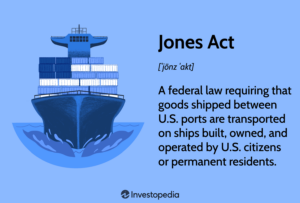
by Ted Galen Carpenter, antiwar.com, April 23, 2024.
Extract:
Despite these spectacular policy failures, drug fighters in the United States and other countries cling to intransigent strategies and refuse to face an inconvenient economic truth. Governments are not able to dictate whether people use psychotropic substances. Such vices have been part of human culture throughout history. Governments can only determine whether suppliers are reputable companies or violent criminal gangs. A ban strategy ensures that it will be the latter – with all the violence and corruption that goes with it. THE ongoing bloody struggles between rival cartels to control lucrative trafficking routes to the United States only confirms this historical pattern.
And a superb last line:
Ecuador is only the most recent proof. Prohibition is like expecting long-term victory in a game of Wack-a-Mole.
I’m a little picky about language. I would have said, “Ecuador is just the latest evidence.” »
by Timothy Taylor, Conversational economistApril 24, 2024.
Extract:
The United States has pursued an industrial policy aimed at boosting its domestic shipbuilding industry since the passage of the Merchant Marine Act of 1920, commonly known as the Jones Act. Whatever the arguments for passing the bill a century ago, over time it has proven to be a disaster for the American shipping industry and continues to impose significant costs on others parts of the American economy. Colin Grabow reviews the arguments in “Protectionism on Steroids: The Scandal of the Jones Act” (Milken Institute Reviewsecond quarter 2024, pp. 44-53).
And:
2) The higher costs of U.S. Jones-Act-compliant shipping naturally impose high costs on places like Hawaii, Alaska, and Puerto Rico. This results in strange consequences, and Grabow provides a number of examples. Puerto Rico gets its liquefied natural gas from Nigeria because there are no Jones Act-compliant U.S. ships to transport natural gas to the United States. American lumber producers complain that they are at a disadvantage compared to Canadian companies, because American lumber producers must use more expensive ships under the Jones Act to ship their products to American destinations , while Canadian lumber producers can use cheaper international shipping companies.
by Marc Joffe. Cato at Liberty, April 25, 2024.
Extract:
Like mom and apple pie, the public library seems so intrinsically good that it should be beyond criticism. But like any institution that consumes millions of taxpayer dollars, public libraries should not be immune from scrutiny. And the fact is that neighborhood libraries have far outlived their usefulness and are no longer bringing in the public money spent on them.
Take for example the situation in Northern California. This fiscal year, four Bay Area counties (Alameda, Contra Costa, San Mateo and Santa Clara) are collectively spending $270 million to operate their library systems, with some cities making additional contributions to fund library hours. extended openings. Contra Costa County is spending $20 million in state and county funds to build a new Bay Point Libraryand El Cerrito voters could see a sales tax measure on the November ballot, part of which will go to build a new library as part of a transit-oriented development near a Bay Area Rapid Transit station.
The historical functions of the public library, which consisted of lending physical books and allowing patrons to consult reference materials, are being made obsolete by digital technology. A growing proportion of adults consume e-books and audiobooks in addition to or instead of printed books, with young adults more likely to use these alternative formats.
by Erec Smith, Boston GlobeApril 19, 2024.
Unlike traditional racism – the belief that certain races are in some way inherently inferior to others – prescriptive racism dictates how a person should behave. In other words, a type of identity is prescribed to a group of people, and any individual who circumvents this prescription is considered inauthentic, even defective. President Biden displayed prescriptive racism when he said, “If you’re having trouble deciding whether you’re for me or for Trump, you’re not black,” a statement that implicitly prescribes how black voters should think.
“Prescriptive racism” is probably a new term to most readers, but it’s not really a new concept. It has a historical analogue: the concept of “haughty negro», a black man who dared to behave as an equal to white people. One of the most famous uses of this term is attributed to Lyndon B. Johnson, who was quoted as saying, “These blacks, they’re getting pretty arrogant these days and that’s a problem for us because they have something now that they never had before, the political appeal to back up their pride.” “Clearly, “uppity” was meant to describe people of color who exercised “agentic” power – that is, they were competent and did not need the heroism of a white person . These “haughty” blacks, so to speak, forgot their scripted lines.


